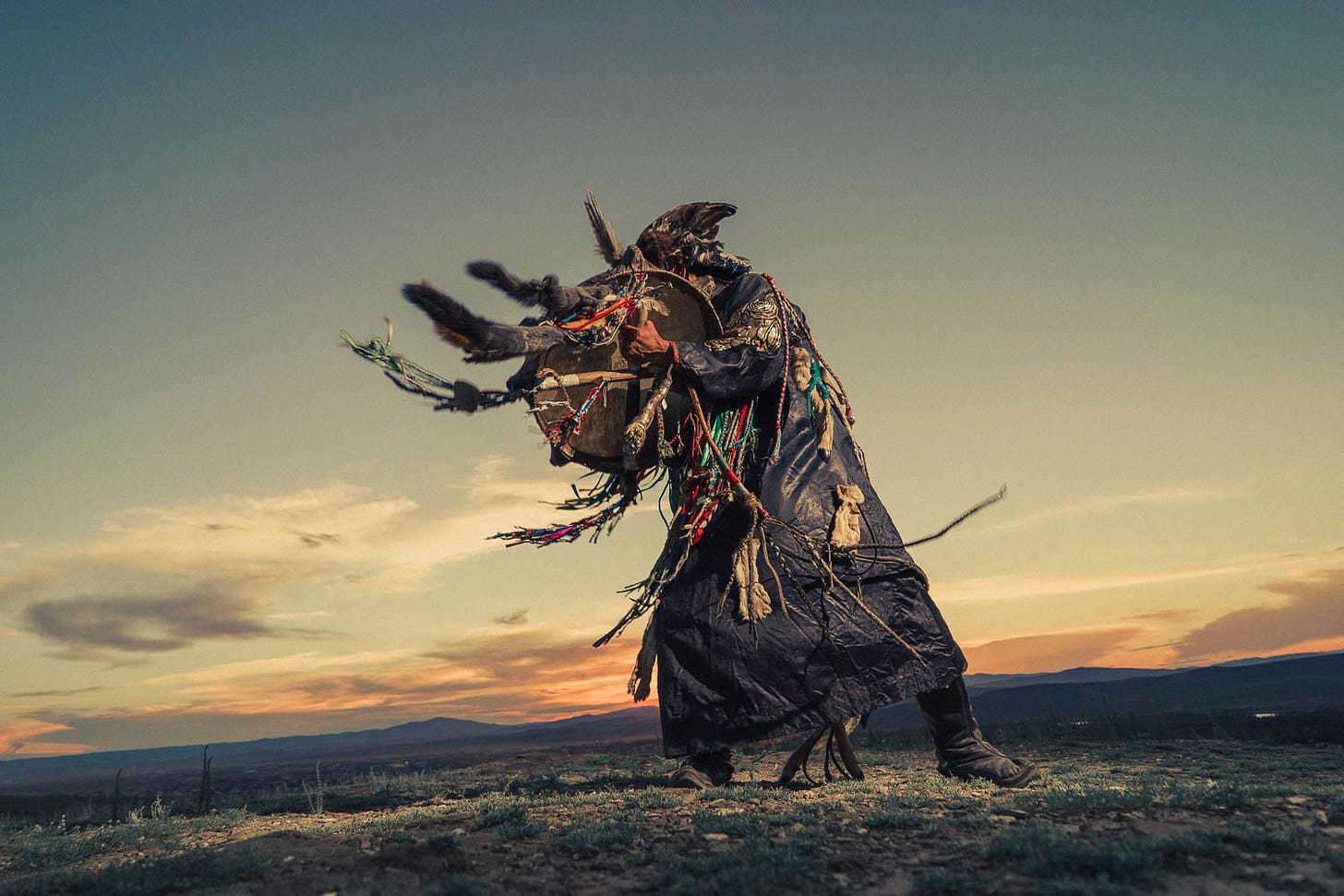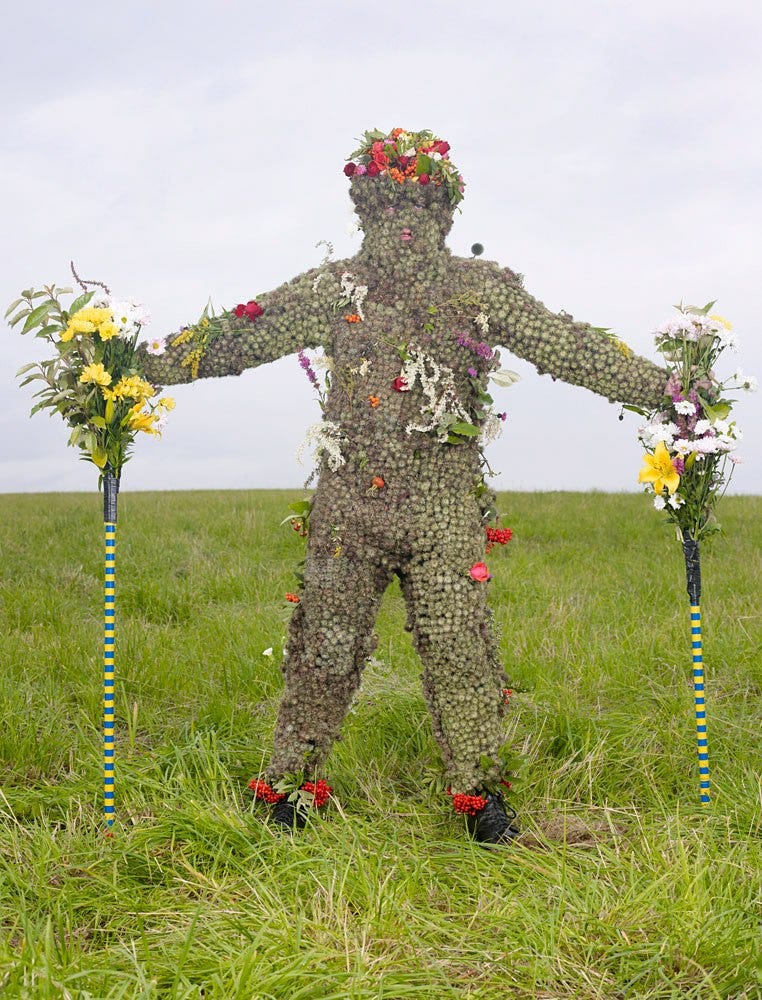HEY EVERYONE!! PLEASE NOTE THE CHANGE OF DATE for next week’s FULL MOON IN SCORPIO RITUAL: Friday, 5/5/23 6pm PST — more info below.
The truth is we’re “allowed” to call ourselves whatever we want. We’re allowed to say and use whatever words we want to…
… but, that doesn’t mean using those words won’t have consequences.
People, (white people in particular, but also people in general) often complain that they’re “not allowed” to say things…
… but the problem lies less in certain words being forbidden, and more in that some people might be offended or hurt if you decide to use them.
So, rather than asking ourselves if witches are “allowed” to use the word shaman, or call ourselves shaman, we might more productively ask — “Who might be hurt if I do?”
According to the Encyclopedia Brittanica (and many other sources)…
“The term shamanism comes from the Manchu-Tungus [people of Northern Asia] word šaman. The noun is formed from the verb ša- ‘to know’; thus, a shaman is literally ‘one who knows.’”
The earliest written version of the word shaman appears in a 12th century Chinese text referring to the practices of the Tungus people. In that case, "shanman [shaman] refer[ed] to an elder sorceress…"
Through a long and complicated series exchanges between the Manchu-Tungus people, Russians who banished their citizens to Siberia, 17th century Dutch diplomats in China, and various Western scholars, the word shaman has come to have two meanings:
Shaman as a generic term: Some scholars argue that the Manchu-Tungus word šaman has its roots in other similar words coming from Turkey [as kam or xam] or India [as snamana]. Therefore, it’s not necessarily native to the Tungus people, even though it’s through them that we see the first documented case of its use. These folks argue that the word shaman has now come to refer to certain people, existing in most (if not all) cultures, who are able to commune with spirits, travel to other worlds while in trance states, work with animal and spirit guides, and provide some sort of healing function for their community.
Shaman as a culturally specific term: Other scholars hold that the term shaman IS culturally specific to the Manchu-Tungus people, and while it may be true that other peoples might have similar practices, they are not identical, and to conflate Tungus shamanism with ALL indigenous healing practices around the world for the convenience of Western scholars is a form of cultural appropriation.
Matters become even more murky when we acknowledge that many indigenous healers around the world (such as Amazonian indigenous healers, and First Nations holy people of Turtle Island) also often call themselves shaman — most likely due to their (forced) exposure to colonial culture.
And…
…while some North Asian people might find it offensive when Westerners refer to themselves as shaman, other North Asian folks may not.
There’s no way to get an “official” statement about whether or not the word is acceptable to use, since no society is monolithic and even people within the Manchu-Tungus culture are going to have differing points of view.
So, what do I personally believe?
There are, for sure, and always have been, Northern European forms of what we call “shamanism” — many of those practices we no longer know the words for because their histories were oral, and either destroyed by Romans, or blended with Christianity, etc.
Many witches do have animal guides, and go into trance states, and bring back medicines and healing techniques for their people, much like shamans do, and furthermore…
… the word witch derives from the verb wit (to know)*, which suggests that like a shaman, a witch may also be “one who knows.”
This idea is supported by the fact that in many Slavic languages, the word witch is ved’ma - with ved meaning “know”. So in Slavic languages a witch is literally the feminine form of one “who knows”.
But, while witches certainly do use many of the same techniques used by people who practice what is commonly called shamanism throughout the English speaking world (and beyond, at this point), the word witch and the word shaman call to mind a different flavor of practice.
A witch is someone who works with plants, who celebrates spirits of place and summons the elemental powers. A witch casts spells, practices divination, and cultivates knowledge of the otherworlds intertwined with this one.
Personally, I like the word “witch”, because it’s root comes from a Northern Europe lineage I claim. Also, I like the confrontational, defiant character of the word “witch”, and the way it calls to mind various fairytales, myths, stories and films.
I love how the witch is, for thousands of years, always against state power — and actively so.
While I’ve never met anyone personally who has said they’re offended by the use of the word shaman, I’d rather not hurt anyone.
For me, witchcraft and enchantment are based on relationship, so I would rather prioritize my relationship to others, particularly those who have been harmed by colonial violence, rather than my “right” to use whichever word I wish.
I have trained with shaman of various kinds from around the world, but at this point my policy is to say that while I sometimes practice shamanic techniques, I AM A WITCH, and my main practice is witchcraft.
There’s much more we could say about this, since the roots of this issue run deep.
If you’d like to discuss this further, come to our reading group this Thursday evening.
We’ll be discussing the essay, “What Happened To Western Shamanism,” by Chas S. Clifton.
Check out the prompts below. Looking forward to seeing you there.
*Some scholars dispute this etymology — there are those who say the root word comes from archaic terms for to bend, some say to shape or to wake, while others say the root word simply points to a sorceress.
**If you’d like to join the Mystery Cult, but are experiencing financial difficulty, we have scholarships available and would love to have you join us. Shoot us an email at: guardian@oracleoflosangeles.com
Mystery Cult Event Calendar
TOMORROW: Thursday, 4/27/23, 6pm: Essay Club. Reading – What Happened To Western Shamanism, by Chas Clifton. An essay discussing the history of shamanism and the differences and similarities between shamanism and witchcraft. (Keep in mind it was written in 2009 - if it had been written today it’s very likely that some of the content would’ve been modified). I’ve linked to a scanned PDF here, but if you’re interested in similar topics I highly recommend the book it comes from: The Paganism Reader by Chas S. Clifton and Graham Harvey.
Sunday, 4/30/23 7pm PST: Petitions Due for Beltane Eve Candle Blessing Ritual for Founder’s Level Subscribers. Make sure that you have your 40 word petitions in for your candle blessing. The theme of this blessing is jouissance, which means physical or intellectual pleasure, delight, or ecstasy. I’m going to be doing a honey spell for y’all, so LOOK OUT WORLD.
NOTE CHANGE OF DATE: Friday, 5/5/23 6pm PST: Full Moon in Scorpio Ritual. Scorpio is the witch, here to guide you towards your greatest power. This Scorpio Full Moon is empowered by the eclipse to make radical breakthroughs: releasing old forms so that we can build new ones. A divination moon, we will listen to the messages that come up from the well, and take a look into our hidden realms. [Sorry about the change of date… I will be attending a memorial for a dear friend].
Friday, 5/12/23 12pm PST: Live Chat on Substack APP, topic TBD
Prompts for Reading Group this Thursday
Based on your reading of the essay, and your own prior knowledge, would you say that the use of the term shaman is culturally appropriative? Why or why not? You can also read this history of the word shaman if you have time.
What do you make of Ginzburg’s suggestion (quoted in the text) that, “all fairy tales involving journeys and quests are shamanistic at their roots; that is, they are based on journeys to the world of the dead”?
In the text Clifton discusses the story of Cinderella and suggests that shaman are often characterized by bodily asymmetry (missing an eye, or a shoe, having a limp, etc.) — do witches have bodily characteristics?
One difference between witches and shaman, as Clifton describes it, is that while shaman travel to the otherworld, witches call the otherworld to us. Do you agree with this characterization? Why or why not?
Clifton discusses how the Mediterranean mystery religions of Orpheus, Isis, Jesus, Mithras and Dionysus, came to being in a time of increasing urbanization and concentration of political power. How do you think the desire to engage in ecstatic rites and journeys to the otherworld might relate to how urbanization and concentration of political power function in the contemporary world?
If you have time to contemplate some of these questions or journal a response to the reading before we meet, great. Otherwise, just show up having read the text.
Note that while these questions might seem a bit high brow, folks who don’t have an academic background are VERY WELCOME to attend.







